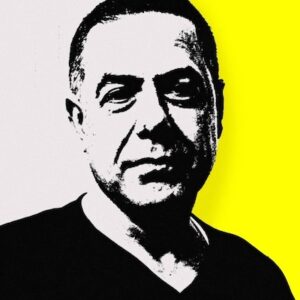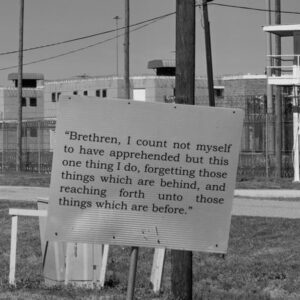The old man lived in a house with a wife he no longer knew was his wife, a son he no longer knew was his son, a little boy, and a woman named Seini, who told him each morning, when he asked where she was from, that she had been born in the island nation of Tonga. The old man, who once served as a physician on a battleship in the South Pacific, had been to Tonga and could recall, with clarity, an American nurse there named Rita—“like the movie star”—and when he told Seini this, his wife would stop and listen from a place he couldn’t see. Almost every day, he told Seini about Rita—it was one of the many stories he told her. He had known this nurse only briefly, he said, and it was wartime, but often in the years that followed, he wondered what would happen if they met again.
“Who knows?” he’d say to Seini, and she’d laugh and answer that he must have been a flirt. Actually, the old man said, he had been a cardiologist.
The first time the old man had spoken about Rita, his wife had pulled Seini aside and explained that this story must be another confabulation. He had never served in the South Pacific, though he’d been stationed in Japan at the end of the Vietnam War. In fact, they’d lived there together. She didn’t know where the story came from, or who this Rita was. To this, Seini listened with the same patience with which she listened to the old man. During the frequent moments when she was asked to take a side between truth and fantasy, she found she often chose the latter. She had been working with the old man and woman for only a year, but she had been a home health aide for patients with dementia since the week she had arrived from Tonga, and she knew with whom, on the deepest level, her allegiance lay.
The house was in Walnut Creek, in what the man had once called “Old Walnut Creek,” to differentiate it from the subdivisions. It sat on a winding road lined with tall walnut trees, and had a small orchard of apricots and apples and a view of Mount Diablo. From the orchard, a path led down into a cool valley of oak and laurel, and from there to the boundary of a state park. Around them, the subdivisions had grown, but this valley remained. “I have the largest backyard in the world,” the man liked to say. The last time he had climbed to the peak was twelve years prior, for his sixtieth birthday, but his physical vigor had long outlasted the functioning of memory, and he could still walk in the valley with his wife, or with Seini. It was thirteen miles to the top, he often told her, just as he told her that the Miwoks of the area had once thought the peak was the center of creation, and that because of the flatness of the surrounding landscape you could watch over everything, could see all the way to the Sierra Nevada, a view farther than from any other mountain in the world.
Later, the old man’s wife must have felt it necessary to confirm this. Or at least to confirm that the old man wasn’t the only person to say this about the view. It wasn’t the height of the mountain, she told Seini, it was its loneliness. This was a funny description, Seini thought, and sensed that it was unintended, and that the old woman was embarrassed she had noticed. So she said nothing, and the old woman continued. She’d been there many times, she said. With her husband. Where they could see clear across the Central Valley, to the thin, white strip of distant mountains, like a tear between earth and sky.
The arrangements of the household had come together quickly, in the second week of the order to shelter in place. Seini had never met the old man’s son or grandson prior to their arrival that Tuesday in late March. They lived in San Francisco and visited only rarely, and before the old man’s memory of his family closed over completely, he’d told Seini that his son was just too busy, “like his pops.” The son had been a great athlete in his youth, the old man said, a baseball player—Seini should have seen him pitch. The old woman had laughed at this and told Seini that the son had been rather mediocre, but that he loved his father more than anything, and the reason he came so infrequently was that it was too painful to see the old man in his dementia. She said this without any bitterness, and Seini understood that she was also speaking for herself.
Given what she knew of the son, Seini had been surprised to hear from the old woman that he would be coming to live with them. But the son, she also learned, had been in the process of getting a divorce when the epidemic struck, and after a week, the couple had found the prospect of further close confinement unbearable. So the son had returned to live with his parents, and brought with him the little boy, who had difficulties with attention and impulsivity, and who, all parties agreed, couldn’t last in the San Francisco apartment without his friends, his school, the parks. Seini was aware, listening to the old woman explain this, that there was even more that was not being shared about the son and the boy, and the mother who would assent to giving up her child. But she didn’t ask. She’d long ago discovered that she could learn much more about her patients and their families by quietly waiting and watching the outlines fill in.
So there were five of them in the house at the end of the valley of oak and laurel. Before the outbreak, Seini drove home weekly to stay with her husband and their youngest daughter in their home in Redwood City. She had two older girls, too—one who was a nurse and one who worked at a supermarket—and a boy, her little boy, who now was twenty-eight and stood six foot five and was a security guard at San Francisco General. When the outbreak began to spread, the old woman took Seini aside and asked about her home situation, whether it was possible to control whom she came in contact with. Seini thought of her youngest daughter’s friends, and her other children’s jobs. It was not possible, Seini said, and so she came to live with the old man and woman, and in the evenings FaceTimed with her family, and when this wasn’t enough to fill the growing emptiness inside her, once a week, she got in her car and drove the wooded streets, the rolling grasslands, the double-barreled tunnel, the snaking highways, the long, bay-skimming bridge—an hour for a trip that usually took two—and she would park first outside her sister’s apartment, and then her own, and talk. On the block where they lived, the buildings were close together, packs of teenage girls roamed in defiance of the isolation orders, and her sister jokingly asked her how it was “out in the woods.” But Seini was hardly the only one among their friends who had come to live apart from their family because the people they cared for were frail and they didn’t want to bring the disease into those homes.
Prior to the son’s arrival, Seini had slept upstairs in the room next to the old man, who because of his nighttime wandering and confusion no longer shared a bed with his wife. It was a big room, with a view of a great backyard fig tree planted when the old man and woman first moved there, and then to the mountain beyond. Long ago, it had been the son’s room, and for a moment Seini worried the son would take it back. But he chose a smaller guest room near the kitchen, where he spent his days in front of a laptop. It was clear from the start that whatever animosities had fueled his divorce were far from cooling, and when the son wasn’t working, he walked up and down the street outside, arguing into his phone. It was better that he kept his distance from his father, thought Seini. For while the old man no longer recognized these new arrivals, he understood intuitively that there was unhappiness about them, and this confused and frightened him. When the son joined them for dinner, he couldn’t resist correcting his father, or looking off when the old man got food on his face, or when he talked endlessly about cardiology and told them the same stories, over and over, about how much the field had changed since he was a medical student. To avoid scaring the old man or the child, they didn’t talk about the epidemic, and so the old man repeated his difficult-to-follow stories, and all the others were lost in thought. All the others, that is, except the little boy, who was transfixed.
Seini’s realization that the boy did not see his grandfather as she did came surprisingly slowly for someone who prided herself on her implicit understanding of families. She would have thought that anyone would eventually tire of hearing, for the eighth time, how the first EKG, devised by Einthoven, was the size of a small car and required the patient to sit with three limbs in buckets of water, or how the old man had been an intern at Stanford when Shumway performed the first heart transplant in the United States, or how, before the development of echocardiograms, he could estimate the ejection fraction of the left ventricle just by placing his palm on a patient’s chest. But the boy—who in most contexts couldn’t sit still for three seconds without reaching out and grabbing something, or making a joke, or rocking back and forth in his chair until it almost tipped over, who always talked too loud, too fast, who interrupted or abruptly left the table—the boy was captivated by the stories, loved the repetitions, just like her own son had asked his father to repeat the same tales from his childhood in Tonga. Sometimes, between the old man’s stories, the boy would tell one of his own, usually a recounting of the plot of a science fiction series he was reading on his Kindle, full of obscure characters and magic portals, a litany of names and technologies not unlike—Seini decided—the history of cardiology. And the old man would listen and, though he asked no questions, exclaim, “That’s right!” and “How about that!”
And so it was that their meals had quickly become a dialogue between two people, and the three in the house who could safely operate a stove or a blender, who read the papers, who had grown increasingly aware of the fragility of life, were quiet and listened and ate.
On FaceTime, at night, when the old man was asleep and the old woman deep in a novel, and before descending the stairs one last time to clean up, Seini would tell her sister about the conversations between the child and the old man. Usually, she didn’t talk so much about the families she cared for, but she worried for the boy. Now, on the news, they were saying that school would be closed for the remainder of the spring, and might not open even in the autumn, and she wondered how a child could grow up alone. On the walnut-lined street, there were families with children, and when she and the old man went walking, she watched them playing in their yards. Some evenings, the boy’s father took him out to play catch, but the boy had poor coordination, and missed almost every ball, and as he scrambled to fetch them in the hedges, the patches of wild daffodils, the gopher holes, his father snuck glances at his phone. All the boy’s classes were over Zoom, and when he was called upon to share something about his life, he spoke enthusiastically and chaotically about the history of cardiology, while his teacher, a woman of Seini’s age, sat on a couch and listened with puzzled amusement, her cats slinking menacingly behind her. But usually, the boy just played with the controls of the computer, making Zoom backgrounds with graphics of spaceships he downloaded from the Internet. Or he curled over the Kindle in his lap, lost in his intergalactic world. Other times, his grandmother sat with him and tried to read to him or talk to him, but the moment he was cornered, he climbed onto the top of the couch and tumbled off, or spun in circles, or suddenly decided he wanted ice from the ice maker, filling a glass so violently that the cubes went skidding across the floor.
It was Seini’s idea to take the boy on her walks with the old man, and then, because her middle daughter had begun to call her crying each afternoon, to let them go on alone. Her daughter had been a dialysis nurse, but when the outbreak started, she was reassigned to the emergency room. Now, every day, she told her mother she couldn’t take it, couldn’t take the death, couldn’t take the families threatening her when they weren’t allowed into the hospital, couldn’t take the feeling that her clothes, her hair, her skin, were covered with a poison that would infect her husband and her children. The street was long and mostly empty, and Seini listened as she watched the boy and man ahead of her. She didn’t have an answer. But she knew her daughter knew this, knew that if she wanted an answer she would have called her father. “It’s fucking unreal,” her daughter said, over and over. Seini didn’t like cussing and, after several days of tolerance, reminded her. “It’s unreal,” her daughter said.
In the street, they sometimes passed dog walkers in masks, but there were few cars and the shoulder was wide. At first, Seini felt guilty for hanging back and letting the two of them walk on together, though she didn’t know if she was entrusting the child to the old man or the old man to the child. What was clear was that both were happiest in one another’s presence, away from the scolding son and the fretting old woman. They made a funny pair. The old man was stocky and broad chested, had thick, gray eyebrows, and wore pressed dress shirts Seini chose for him each morning, an old trick she’d learned to make her patients feel like they were preparing for an occasion, just as she daily shaved their faces and trimmed their hair. The little boy, gangly and mop haired, had come with seven T-shirts, all of which bore the image of either Harry Potter or a character from Star Wars. Even after a month had passed, she couldn’t say whether the old man knew that the leaping, loud, endlessly inquisitive child was his grandson, or whether the boy knew that the old man had no memory of what they’d discussed the day before.
The old man, despite his difficulties bathing or dressing, was steady with a pair of hiking poles, and though Seini worried that the child, who skipped and ran circles around him as they walked, would leap onto his grandfather or knock him over, this never happened. What did happen, one day, was that the boy dashed into the street to examine the body of a flattened squirrel, and was nearly hit by a passing car. Seini told no one, but from then on, they took the little path out of the backyard that led down into the valley. She felt less comfortable there: she saw the scat of wild animals, and turkey vultures wobbling in the sky above. But the ease of the old man reassured her. There, she understood, he could rely on instinct, habit, and she reminded herself that he’d known the mountain longer than she’d been alive. Other times, however, she thought of another story he’d told her, this one from his childhood, about a great black wolf that dragged a boy out of his schoolhouse in Circassia while the other children watched. Later, his wife had come and found her in the kitchen to tell her that he’d invented this one, too. The old man was born in Queens, New York; she’d always guessed the story came from his father, who’d passed through Central Asia after his internment in a gulag during the Second World War. A gulag, she added, was a labor camp.
“And did the boy survive?” Seini had asked her.
“The boy?”
“The boy in the story.”
“Oh,” said the old woman. She paused for a moment and looked at Seini in a way that she hadn’t before. “You know, I never asked. But I’m not even sure there was a boy. His father also made things up.”
May passed. The leaves grew thick on the walnuts, and green figs budded on the backyard tree. The valley bloomed with California poppy, then white flowers that reminded Seini of the morning glories she would pick in Tonga, and then, in thick patches, a small, blue-violet blossom whose name she didn’t know. The days turned warmer, and her asthma flared, and she found herself needing to stop and rest on a long, recumbent branch of laurel, behind a bench that had been wrapped with yellow warning tape. There, the signal was good, and she could listen to her daughter while the old man and the little boy continued along the trail, ten, fifteen minutes to the gate at the end of the valley and back. Soon, she unrolled a little blanket, took off her shoes, and massaged her feet. Fierce, bristling caterpillars stalked among the waving grass, little black-caped birds warily inspected her, and a pair of mushrooms broke the hard clay earth, grew tall, and shriveled in the heat. In the distance, she could hear the boy shouting, or singing, but there was no one nearby to admonish him. If she didn’t worry about the old man or his wife, or the little boy, or her son, or her husband or her daughters, she realized she was almost happy.
When the man and boy would return, she’d find them talking about exactly the same things as when they’d left. Sometimes, they were so lost in conversation, or in parallel worlds that didn’t involve one another, that they didn’t even seem to notice her waiting, and she had to hurry to catch them. Back at the house, the old man would nap and the boy would disappear into his Kindle. And after dinner, they would go out again, each day like the last, the time dissolving, Einthoven, Shumway, and magic portals, until the June evening when Seini lay down beneath the laurel, amid the garrulous company of the birds, and somehow, thoughts slowing in the dry and golden heat, drifted off to sleep.
She was awakened by the scuttling of a squirrel and a cool breeze rising through the valley. At first, she didn’t know where she was, and took a moment to register the laurel and the dimming sky. It wasn’t the first time she’d fallen asleep there, but it was the deepest she’d slept in a long while, deep enough to dream that she was back in Tonga, only now with the old man and the little boy. They were in the ocean, bobbing up and down, and she was watching from the shore. There was nothing unusual in this; almost all her dreams were about caring for others, seeing them in danger, and trying—with legs that wouldn’t move, a voice that couldn’t cry for help—to save them. In this one, there was something beautiful about the way they floated in the swells, but the moment that she tried to reach them was the moment she awoke.
She sat up. Dusk was falling. The birds had vanished. Her eyes followed the trail to the final turn before it disappeared behind the oaks, but it was empty. Slipping on her shoes, she stood and gathered the blanket. They must have passed her, as they often did, she thought, and with this thought she felt suddenly faint, and wondered if she had stood too quickly. There was no reason to worry, she told herself, but then her chest was very tight. Instinctively, she rummaged through her purse for her inhaler, until she recalled that with the pandemic her pharmacy had been unable to refill her prescription.
It was only ten minutes back to the house, but with her shortening breath she had to stop twice, and she reached the yard in darkness. Almost instantly, she knew they weren’t home yet. Inside, the house was too quiet, and the old man’s hiking poles weren’t resting against the stairs, where he usually left them. The boy’s father was at his laptop, and the old woman was upstairs, talking to one of two different book clubs that gathered over the computer on certain evenings, though when Seini listened, she heard the old woman talking only about her husband. Seini thought of interrupting, of asking for help, and yet she knew that would mean admitting more than just a momentary lapse, it would mean renouncing a central premise that had sustained her, that the world was something that could be tended. She returned outside, and went around to the front of the house. But the street was also empty, empty of the masked dog walkers; even the neighbors’ homes seemed abandoned. In her pocket, her phone buzzed, and she fumbled for it, as if the person calling might have an answer for her predicament. But when she looked, she realized she had only imagined it. There was just the time, and the lock-screen photo of her middle daughter sticking out her tongue, a prank she’d played long ago when Seini was still learning to use the iPhone, but an image that, for so much carelessness and joy, she kept.
Still holding her phone, she circled back to the yard, and then beyond to the path, as the view of the peak opened before her. She was walking faster now, down into the valley, where she paused once more. Possibilities rose about her. Wolves pawed the fresh snow; bodies broke through the wave curl; between earth and sky, a magic portal opened. The world turned slowly around the axis of the mountain. Far away, her daughter was laughing again. A wind came over the hills, the trees, the valleys. Her lungs returned and she began to run.
__________________________________
“The Wolves of Circassia” first appeared in Zoetrope. Copyright © 2021 by Daniel Mason. Reprinted by permission of the author.













